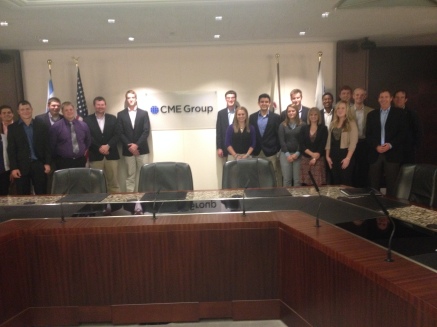On Thursday, September 18th, CRMER Student Fellows enjoyed of a great visit hosted by the CME Group at the Chicago Board of Trade facilities in downtown Chicago. The Fellows where welcomed by Fred Seamon, Sr. Director, Commodity Research and Product Development and Matt Herrington, a K-State Alumni and Manager, Commodity Research and Product Development at the CME Group.
Fred and Matt led a tour through the CME Group’s now consolidated trading floor, where the Fellows experienced the historic, but now declining “outcry trading” in the traditional grains and livestock pits for futures and options and in the financial products’ pits. Open outcry trading accounts for around 10% of CME Group’s overall volume. Options has a heavier presence in the trading floors compared to futures, due to the complexity of options’ trading.
The tour to the trading floor was followed by a presentation by Bill Lange, Director, Market Surveillance. Market regulation’s overall purpose is to oversee market transactions on the exchange including trades and positions and to identify potential trade practice abuses. We heard about the Market Surveillance’s great emphasis on getting to know their customers, what their business is, and how they manage their risk in order to be able to better serve them and to better comply with the regulators. We learned about how different trading limits apply in different ways to hedgers and speculators and the factors that drive those limits, mainly delivery capacity from the exchange delivery facilities. It was interesting to hear the exchanges opinion about how the 2008 financial crisis influenced the relationship between the exchange and the regulators.
After hearing from outcry trading and market regulation, Jeff Hersh, from Global Account Management, talked to us about electronic trading. CME Group owns probably the world’s largest electronic trading platforms called CME Globex. CME Globex serves a wide variety of products and clients from around the globe, accounting for almost 90% of CME Group’s trading volume. Jeff also discussed about equal access and data distribution which guarantees fairness for market participants. In that direction, trades on Globex get registered by the matching engines on a first come, first serve basis. This is important to mention due to the ongoing controversy regarding market unfairness, specially relating to HFTC (High Frequency Trading) firms enjoying from speed benefits mainly in the stock markets.
Lastly, Jack Weaver, former trader on the CBOT trading floor, K-State alumni and now a personal trader (trading with his own funds), shared his personal experiences and interest in the futures markets since he was a kid, when he used to compare his profits from hog sales across years. Jack shared how the introduction of electronic trading changed his modus operandi, especially, the introduction of electronic trading allowed him to trade more variety of asset classes. He also stressed the importance of maximizing the use of strengths while minimizing weaknesses, which is key to being a successful trader. More narrowly, to know the behavior/performance of cash markets and timely access to good data, are key factors for successful traders.
The Fellows at the Center for Risk Management, Education and Research greatly enjoyed the financial markets experience and knowledge shared by the speakers. We very much appreciate CME Group’s hospitality and commitment to education through their support to the center.

